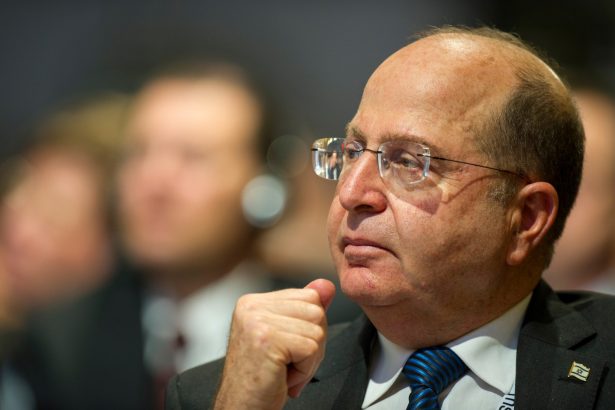Moshe Ya’alon is a former Chief of Staff for the IDF and served under the Netanyahu government for three years as Defence Minister. Since resigning from the Defence Ministry in May 2016, Ya’alon has left the Likud party to set up his own NGO and form a new political party, in which he intends for challenge for Israel’s next Prime Minister. He spoke to Fathom editor Professor Alan Johnson on 20 March 2017 about the internal challenges that face Israel and why the current leadership is not able to meet them.
Alan Johnson: You’ve announced that you are establishing a new party to seek to lead the country; Israel already has a lot of parties, why is another new party needed?
Moshe Ya’alon: I haven’t found in the existing parties what I really believe in. I want to lead in my own way. I have 21 years of experience in Israeli cabinets. I have participated in the Israeli cabinet since 1995, serving as the head of Intelligence under the late Yitzchak Rabin. I have seen Israel under five Prime Ministers, and I have drawn my own lessons. I don’t find in the current parties my own understanding of the challenges facing our country – whether they are external or internal challenges. I wished to find this understanding in the Likud party and I did so in 2009, but the Likud moved to the extreme. I decided to resign not only due to clashes with the prime minister but also with other members of the Knesset and ministers in the government. My main dispute with the prime minister is not about foreign affairs, but about internal issues: corruption; moral issues on checks and balances; the role and control of the media – I’m not afraid of being criticised by the media, it is part of democracy; and of course the role of the Supreme Court and the rule of law. But I do believe that we have a vibrant democracy.
So my decision is to establish my own political vehicle based on what I believe in and to be engaged with as many Israelis as I can be. I don’t have a newspaper, I don’t have a TV channel, so the best way is to meet the people; seven to 10 speaking engagements every week with youngsters, the periphery, settlers, Kibbutzniks, with whomever. I am prepared to find what kind of cooperation is possible with other existing parties, in order to lead.
AJ: And when you sum up to the Israeli voter what you believe in – what the new party stands for, and what makes it distinctive – what will you say?
MY: On the defence and security issues I’m a hawk – this is well known in Israel. I believe that we should keep Israel as a Jewish and democratic state. We must uphold Jewish values – the sanctity of life and acting in a certain way to the ‘Other’ – not generating hatred against the Arabs or to those not agreeing with you, whether they are ‘Leftists’ or ‘Rightists’ or Orthodox, Ashkenazi or Sephardim. Is this a way to lead a country, by generating hatred towards someone? No, this is not the Jewish way.
I stand for the rule of law when it comes to democracy. I am against attacking the judicial system and I am unafraid of criticism generated by the media. And enough of this business of blaming every critic as a ‘leftist’. We should stand for pluralism. What does it mean when we hear from ministers and members of the Knesset that the government should control the media? That goes against the idea of democracy, of checks and balances.
I take my own way, the old Likud way. I didn’t leave the Likud, the Likud left me. Benny Begin would not be able to win a primary in the Likud party today, as he is now considered too ‘leftist’ after he was the only one who voted against the Regulation Law. That law is illegal – can you confiscate private land from someone to give to another person? No! We heard ministers say the bill was illegal, that the attorney general rejected it, that the Supreme Court would overrule it, and that if we did vote for it we might be brought to the International Criminal Court in The Hague. And what happened? They voted for it and part of the politicians said cynically that it doesn’t matter because the Supreme Court is going to overrule it. This is leadership? It’s about political survival, this behaviour.
AJ: Do you think you can win over the Israeli people? If we take the Elor Azaria case as an example, half the country didn’t share your position.
MY: First of all, I have to try. Second, I believe that the vast majority of Israelis prefer my way. They don’t understand the current challenge in many cases and I am there to explain it. Undermining the rule of law and making moves towards government control of the media are threats to Israel’s democracy. We must avoid hatred towards the Arabs of Israel. Hearing a member of Knesset say he would not allow his wife to give birth in the same room as an Arab woman gave birth – does he listen to himself? If this was said about a Jewish woman it would be regarded as anti-Semitism, so why is it not considered racism? How can we tolerate this kind of language? I am a nationalist but not a racist. I believe that vast majority of Israeli are rational; yes, they have moved to the Right because of the frustration of the outcome of the Oslo Accords, but they are not extremists.
AJ: On the issue of the Palestinians you set your ideas out in your recent article in Foreign Affairs. Recently BICOM held a track-two event with Israelis and Palestinians and I was talking to an experienced Palestinian negotiator who thought Israel was aiming to create the ‘United Palestinian Emirates’ – small, non-contiguous areas but not a state. He said the Palestinians would never acquiesce to that. But in recent interviews you’ve hinted that the Palestinians will eventually acquiesce in something less than a state. Why do you believe that?
MY: I have to go back to late Prime Minister Rabin’s speech on 5 October 1995, given less than a month before his assassination, as he brought the second half of Oslo to the Knesset to be approved. It was his final speech concerning the Israeli-Palestinian conflict. He said that the Palestinian entity should be less than a state. Then he said we can’t withdraw to the 1967 lines, which are not defensible borders. We have to impose our sovereignty on the settlement blocs; we have to control the Jordan Valley – in the broadest interpretation of the term the Jordan Valley (the Yigal Alon Plan from the Jordan River to the mountains) – because of security. And Jerusalem should be unified forever. That was Rabin’s position.
So why did he claim Palestinian entity would be less than a state? According to Oslo, the Palestinian entity should be a demilitarised political entity and Israel should be responsible for the overall security (air space, sea access, border access etc.) for the entity. If you give up this kind of control you will have to deal with Iran in Nablus, in Tulkarem, in Qaqilya threatening Ben Gurion International Airport, or Tel Aviv.
That is why I claim it is best to leave the big ideas alone and instead to try and make progress from the bottom-up. Actually today we have a kind of modus vivendi which is bearable for the Palestinians as well as for the Israelis. We currently do not have a partner to negotiate on the 1967 lines. Arafat rejected them in Camp David in 2000; Abbas rejected them after Annapolis in 2008. They rejected any kind of territorial concession since the Peel Commission in 1937 and even the 1947 UN Partition Plan proposal, and so forth. So let’s make progress from the bottom up for the benefit of the two peoples. Then, if Palestinians begin to change their educational system and stop promoting terrorism, we can discuss other issues. But let’s make progress from the bottom up, first of all.





































